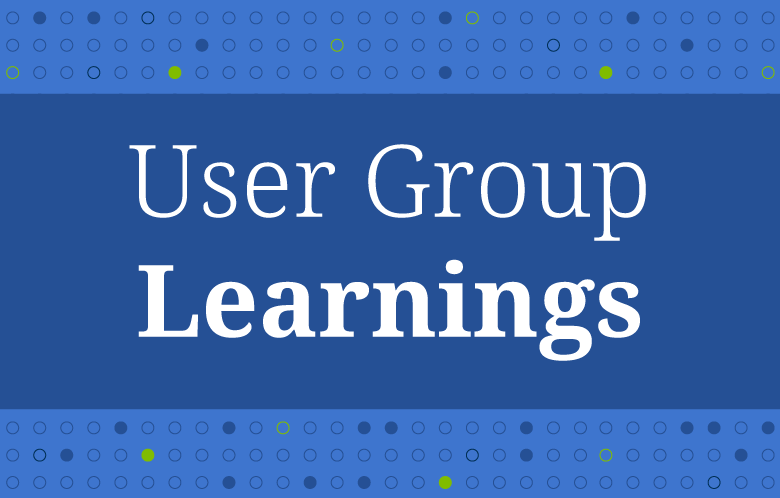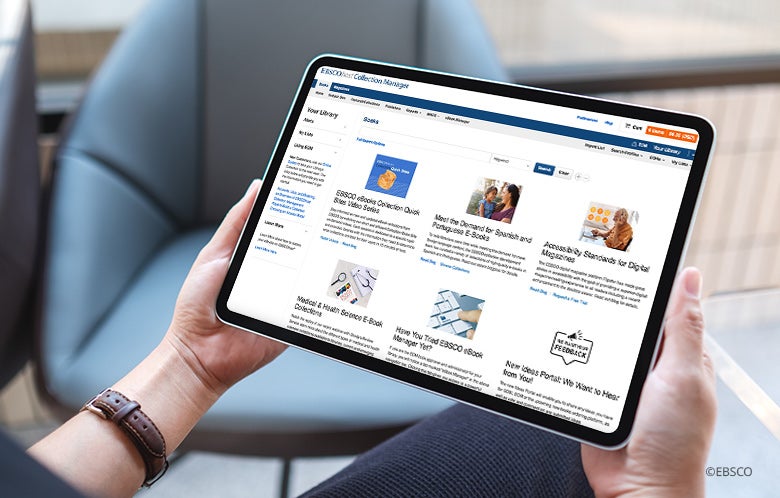Representatives from EBSCO eBooks and GOBI Library Solutions attended the User Group to not only present new services that help streamline e-book acquisition and management workflows but also to hear directly from our customers. This feedback and input from our customers is crucial to ensure we’re building the services that libraries need. Here are the top Books-related themes we heard at this year’s User Group.
eBook Manager Enhancements
Libraries need more control over their eBook collections in order to maximize availability for users. The release of eBook Manager has provided libraries with many new ways to view and manage the EBSCO eBooks in their collection, which are helping them to better understand and leverage what they own and access. Librarians reacted positively to the addition of new data to turnaway alert emails and more granular settings for turnaway alerts within eBook Manager, all of which were released in July 2023. Libraries have indicated that these options will save them and their staff significant research time and reduce cognitive overload when deciding whether to upgrade an eBook in their collection. We heard about other things libraries would like to see in eBook Manager, such as identifying eBooks that will be removed from subscriptions and providing instant access URLs provided at the time of order. We will incorporate this feedback into our roadmap.
“The release of eBook Manager has provided libraries with many new ways to view and manage the EBSCO eBooks in their collection."
“The release of eBook Manager has provided libraries with many new ways to view and manage the EBSCO eBooks in their collection."
EBSCO eBooks in the New UI
There are two key advantages for EBSCO eBooks in the new UI. First, we see more graceful handling of library-specific settings from eBook Manager on the new UI compared to what we can do in the Classic interface. Secondly, the forthcoming improved download workflow for EBSCO eBooks in the new UI will highlight chapter downloads over full book downloads, to encourage users toward a less complex download process. The migration to a new UI is in the future for many libraries, so we encouraged librarians to begin previewing the new UI if they are not already to inform their migration timeline. This will enable libraries to test out the refreshed user experience, learn about its many advantages over our Classic interfaces, and provide feedback to EBSCO about what their library needs for a successful migration.
“The migration to new UI is in the future for many libraries, so we encouraged librarians to begin previewing the new UI if they are not already to inform their migration timeline."
“The migration to new UI is in the future for many libraries, so we encouraged librarians to begin previewing the new UI if they are not already to inform their migration timeline."
E-Book Collections: Content and Workflow Efficiencies
No two libraries’ collections are the same, and their collection development needs will vary based on their unique goals and resources. In the eBooks session, we reviewed the variety of EBSCO eBook curated collections offered to satisfy any library’s budget and request. We explored perpetual-purchase featured collections covering topics like Diverse Perspectives in Literary Criticism, Neurodiversity Awareness, and Sustainability twice-annual subject sets that never overlap previous years’ subject sets, and subscriptions of varying sizes which provide unlimited user access at a low per-title cost. And if none of those provide what a library needs, our team of collection development librarians is always available to create a customized collection based on a library’s unique parameters, providing budget flexibility and saving staff time to identify and source high quality eBooks in specific areas of need./span>
“If none of those [collections] provide what a library needs, our team of collection development librarians is always available to create a customized collection based on a library’s unique parameters.”
“If none of those [collections] provide what a library needs, our team of collection development librarians is always available to create a customized collection based on a library’s unique parameters.”
DEI Collection Development Remains a Priority
Librarians continue to grapple with how to collect books from and about diverse voices, and, especially in today’s climate, it remains of utmost importance to libraries to present broad viewpoints to their patrons. Libraries are also struggling with analyzing what they already own and where there are gaps in their collections. GOBI continues to try to help in these areas by offering interdisciplinary tags on books, providing analyses of collections using these tags, and continuing to expand our awards and reviews services, while still bumping up against some of the same challenges libraries are facing, such as author self-identification and finding and acquiring from small presses.
We are thankful to be able to hear from a wide variety of libraries on their books-related workflows. The feedback we received is invaluable as we look forward to the future of our products and services. We can’t wait to see everyone again at the EBSCO User Group next year.



